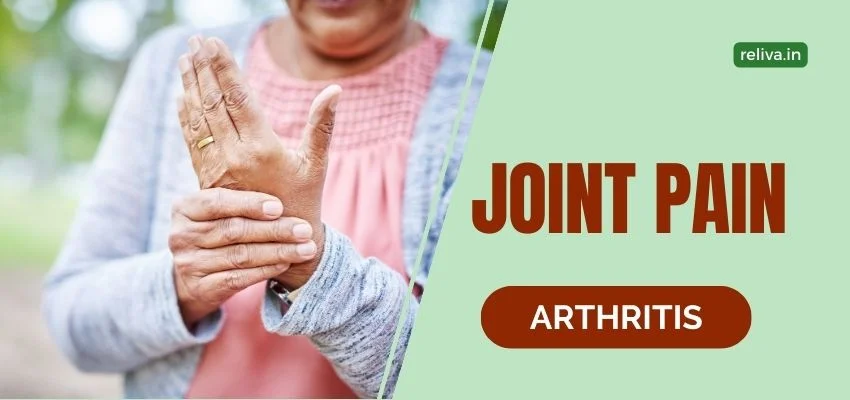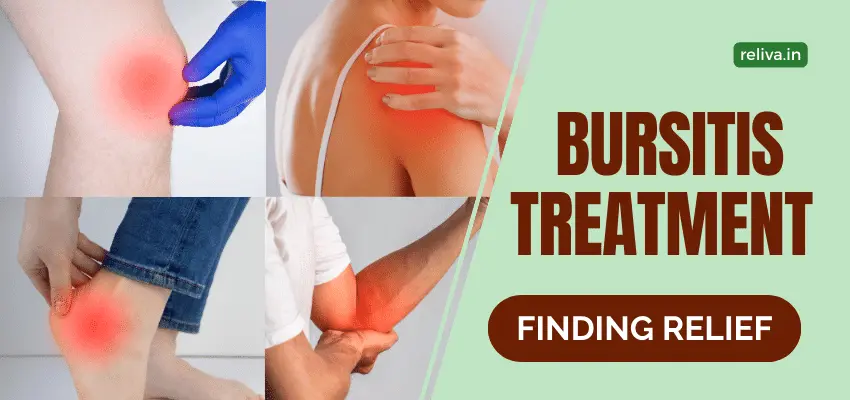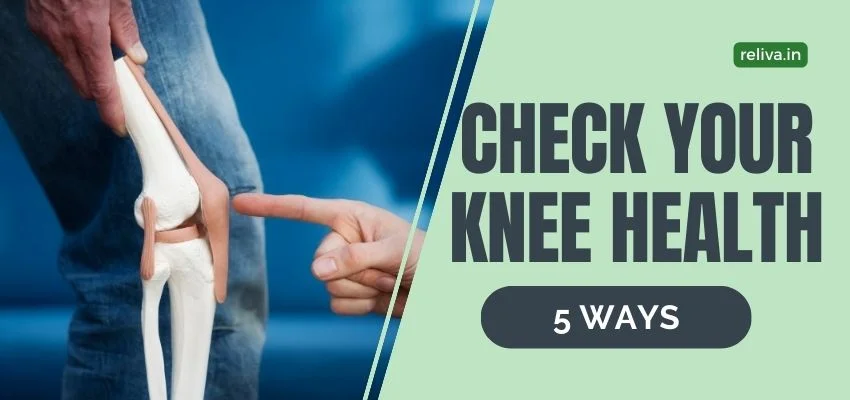Joint Pain
Osteoarthritis (OA) or commonly referred to as “arthritis” – usually sets in with age, causing joint pain and stiffness. The joints most affected by OA are the hip, knee, hand and foot. However, any joint in the body can be affected by the condition. The usual arthritis symptoms can be treated effectively with Physiotherapy. As Ms Banumathy says, “I had severe arthritis causing shoulder pain and knee pain. I couldn’t even move my hand due to pain, couldn’t walk normally, had sit to stand difficulty. Then I met Dr Kanchana, ReLiva Physiotherapist in Chennai. She treated my pain and difficulty with modality; advised to do exercises. It was so helpful. I feel much better and got relief from all my symptoms.”
Arthritis Could Affect Anyone
Joint pain can occur anytime throughout the year, but in the cold and wet months, you may find it harder to cope with. “Although a change in the weather will not cause arthritis, it can worsen the symptoms”, says Dr Lakshmipriya (PT), musculo-skeletal specialist. When we are cold, our body restricts how much blood it sends around extremities, like our hands and feet, so that it can focus on supplying vital organs like the heart and lungs.
This means we lose less heat from blood circulating near the surface of the skin, but it also means the joints get less blood and, for some, this can be painful.
Dr Priya explains: “Temperature & weather changes can aggravate the symptoms.” You may notice increased knee pain in the rainy or cold weather. Since OA is a degenerative condition; the damage occurred cannot be reversed. But timely intervention in the form of regular exercise or early physiotherapy intervention can arrest degeneration & maintain joint integrity.
What is the treatment for osteoarthritis?
Joint pain is the most common complaint among OA sufferers. The following treatments can improve arthritis symptoms.
1. Physiotherapy Exercise for OA:
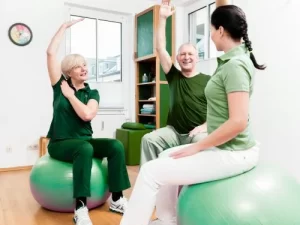
Research literature conducted by numerous studies recommends that “exercise is arguably the most important treatment for OA”1. As such, OA treatment should include a rehabilitation program that incorporates exercises guided by an experienced physiotherapist. Generally, strength gains are noticed after approximately 6 weeks – if exercises are performed diligently. (See FAQ “Why does my physiotherapist make me exercise?)
2. Manual Therapy
Physiotherapists are trained in specific manual techniques to improve symptoms associated with OA.
3. Modalities
Electrical modalities can assist in reducing pain levels temporarily.
4. Medications
Some medications offer pain relief. Speak to your doctor or pharmacist regarding the options available.
5. Surgery Joint Replacement
In severe cases, joint damage may require joint replacement for return to functional activities. In these circumstances, it is important to see a physiotherapist both before and after surgery.
Also Read: Pre operative and Post operative Physiotherapy
Recovering After Surgery With Physiotherapy
Is Joint pain worse in the winter?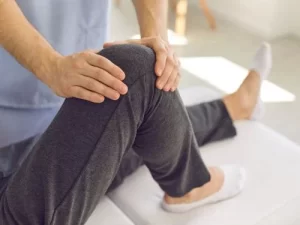
Although pain is unpleasant, it’s your body’s way of telling your brain that something is wrong. Pain is a protective mechanism to stop further damage but arthritic pain doesn’t mean you should dive for the blanket and quit exercising altogether.
Remaining active is vital. Don’t let the cold weather put you off – Exercise will help keep your joints supple, which can reduce pain and help you stay independent.
What is best for osteoarthritis pain?
If there is no swelling, then heat treatment can help relieve joint pain and stiffness. Apply hot pack at the affected joint for 10-15 mins, up to three times a day. Use Cold pack to reduce inflammation, swelling, and pain related to arthritis and activity.
As the pain subsides, perform joint exercises to improve your strength and mobility. These exercises can be learnt from a physiotherapist and practised at home regularly.
Call us at +91 9920991584 or ask for call back and we will connect you with a physiotherapist near you.
Is physiotherapy good for osteoarthritis?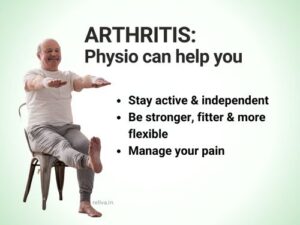
Exercise can help to manage some of the symptoms of arthritis. Physiotherapists provide advice and education on exercise, pain relief and ways to manage your condition. They can teach you how to improve your joint movement and your walking, as well as how to strengthen your muscles.
Being active can really help you to stay mobile and independent.
How can I help myself for joint pain?
There are exercises that can reduce joint pain and ways to try and avoid it coming back. Depending on the individual person, changes in your posture and lifestyle may be useful.
Learning how to ‘pace’ yourself will help you to carry on with your usual activities. Pacing yourself means that you keep active without overusing an arthritic joint.
Top tips to manage arthritic joint pain:
- Stay active. Go for a gentle walk everyday.
- Avoid offending movements in case of existing pain.
- Use your largest and strongest joints and muscles for daily tasks. For example, use a bag with a shoulder strap across your back, rather than holding a case or bag in one hand.
- Balance rest with activity. Take breaks as and when needed, but avoid resting for lengthy periods, as this can cause muscle stiffness.
- Practice specific exercises for joints.
- Get advice on how to manage your condition yourself.
- Seek advice to see if walking aids, a support or brace would help.
Need Professional Help for Joint Pain?
ReLiva Physio can make an exercise plan for you!
What happens if osteoarthritis is left untreated?
OA is a degenerative condition; the damage occurred cannot be reversed.
If left untreated, the joints will degenerate to cause near complete lack of movement at the joints. This will need severe measures like joint replacement surgery like Knee replacement. Hip replacement etc.
Read: Knee Replacement Surgery – Care & Exercise
You are also likely to see a physiotherapist before and after a joint operation, such as a total knee (TKR) or total hip (THR) replacement. The physio will help you walk properly and make sure you are recovering well.
Timely intervention in the form of regular exercise or early physiotherapy intervention can arrest degeneration & maintain joint integrity.
Does physiotherapy help osteoarthritis of the hip?
Exercise is one of the best things you can do to help your hips. Hip Exercises can treat the problem from its root cause and give long-term relief or permanent relief from the struggle. A physiotherapist will teach you exercises based on your assessment, as they deem appropriate for your specific functional needs. It is important to follow the dosage of these exercises as well as the gradual build-up so as not to add to the damage.
See: Hip Pain Treatment
Is physiotherapy good for knee arthritis?
Physiotherapy is known to have been especially effective to resolve knee pain related to Arthritis2
Watch: Knee Pain Treatment Recovery with Physiotherapy : Patient Testimonial
Read: Knee Pain Treatment with Physiotherapy
Have Joint Pain?
Pain Relief is possible
Related Reading:
Ageing Knees? Don’t go weak in your Knees
Five Ways to check your Knee health
Arthritis – Do your Joints Pain?
Scientific References:
1] FRIES, J.F., BRUCE, B. and SHOOR, S. Osteoarthritis, Exercise and Knee Replacement. The Journal of Rheumatology, volume 36 (no.4), p. 669-671. http://www.jrheum.org/content/39/4/669
2] Effectiveness of home-based physiotherapy on pain and disability in participants with osteoarthritis of knee: an observational study; Gaurav Shori, MPT, Gagan Kapoor, MPT and Prativa Talukdar, MPT; Published online 2018 Oct 12. doi: 10.1589/jpts.30.1232

